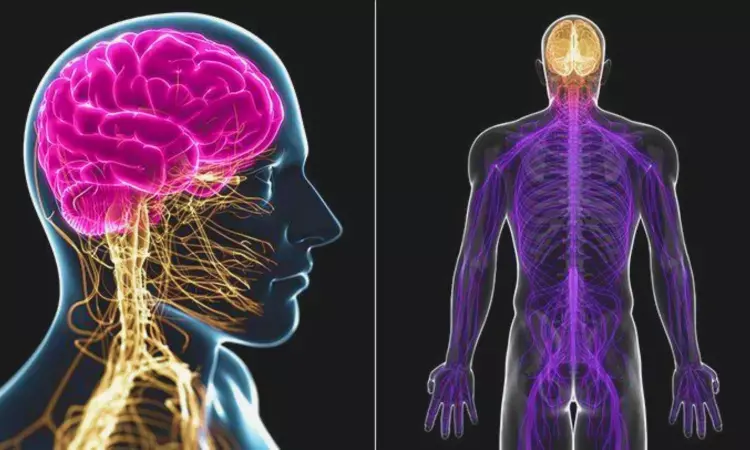- Home
- Medical news & Guidelines
- Anesthesiology
- Cardiology and CTVS
- Critical Care
- Dentistry
- Dermatology
- Diabetes and Endocrinology
- ENT
- Gastroenterology
- Medicine
- Nephrology
- Neurology
- Obstretics-Gynaecology
- Oncology
- Ophthalmology
- Orthopaedics
- Pediatrics-Neonatology
- Psychiatry
- Pulmonology
- Radiology
- Surgery
- Urology
- Laboratory Medicine
- Diet
- Nursing
- Paramedical
- Physiotherapy
- Health news
- Fact Check
- Bone Health Fact Check
- Brain Health Fact Check
- Cancer Related Fact Check
- Child Care Fact Check
- Dental and oral health fact check
- Diabetes and metabolic health fact check
- Diet and Nutrition Fact Check
- Eye and ENT Care Fact Check
- Fitness fact check
- Gut health fact check
- Heart health fact check
- Kidney health fact check
- Medical education fact check
- Men's health fact check
- Respiratory fact check
- Skin and hair care fact check
- Vaccine and Immunization fact check
- Women's health fact check
- AYUSH
- State News
- Andaman and Nicobar Islands
- Andhra Pradesh
- Arunachal Pradesh
- Assam
- Bihar
- Chandigarh
- Chattisgarh
- Dadra and Nagar Haveli
- Daman and Diu
- Delhi
- Goa
- Gujarat
- Haryana
- Himachal Pradesh
- Jammu & Kashmir
- Jharkhand
- Karnataka
- Kerala
- Ladakh
- Lakshadweep
- Madhya Pradesh
- Maharashtra
- Manipur
- Meghalaya
- Mizoram
- Nagaland
- Odisha
- Puducherry
- Punjab
- Rajasthan
- Sikkim
- Tamil Nadu
- Telangana
- Tripura
- Uttar Pradesh
- Uttrakhand
- West Bengal
- Medical Education
- Industry
Early patisiran initiation safe, effective in hereditary transthyretin-mediated amyloidosis with polyneuropathy: JAMA

In the longest study of an RNAi therapeutic for any disease, patisiran treatment demonstrated modest improvements in patients with hereditary transthyretin-mediated amyloidosis with polyneuropathy (hATTR-PN) while maintaining an acceptable safety profile. These findings underscore the importance of initiating early treatment for hATTR and emphasize the promising role of RNAi therapeutics in advancing medical care.
There is a lack of long-term efficacy and safety data on hereditary transthyretin amyloidosis with polyneuropathy (hATTR-PN) and on RNA interference (RNAi) therapeutics in general. This study presents the longest-term data to date on patisiran for hATTR-PN. A study was done to present the long-term efficacy and safety of patisiran in adults with hATTR-PN.
This global open-label extension (OLE) of the APOLLO randomized clinical trial and phase 2 OLE study enrolled patients from 43 hospitals or clinical centers across 19 countries between July 2015 and August 2017, with follow-up until November 2022. Of 212 eligible patients with hATTR who completed the phase 3 APOLLO or phase 2 OLE parent studies, 211 enrolled in and 138 completed the global l open-label extension.
Outcomes evaluated at year 5 of the global l open-label extension included disability (polyneuropathy disability [PND] score); polyneuropathy severity (Neuropathy Impairment Score [NIS]), nutritional status (modified body mass index [mBMI]), quality of life (Norfolk Quality of Life–Diabetic Neuropathy [Norfolk QOL-DN]), and Rasch-Built Overall Disability Scale (R-ODS), with no statistical hierarchy. Safety, survival probability, and mortality were also assessed.
Results At the global OLE baseline, the mean (SD) age was 61.3 (12.3) years, and 156 patients (73.9%) were male. In 138 patients completing the study, PND scores remained stable or improved in 89 patients (65.0%), NISs showed a mean (SD) change of 10.9 (14.7), and mean (SD) mBMI (calculated as weight in kilograms divided by height in meters squared times serum albumin in grams per liter) increased by 46.4 (120.7) over 5 years from baseline. Norfolk QOL-DN and R-ODS scores showed mean (SD) changes of 4.1 (16.7) and –3.7 (6.2), respectively.
Adverse events (AEs) leading to study withdrawal occurred in 47 patients (22.3%). Infusion-related reactions were the most common treatment-related AE (n = 34 [16.1%]). Overall, 41 patients (19.4%) died during the study. Patisiran treatment in the parent study and low familial amyloid polyneuropathy score at parent study baseline were associated with significantly improved survival. In the longest study of an RNAi therapeutic for any disease, patisiran treatment resulted in modest changes for patients with hATTR-PN with an acceptable safety profile. These results highlight the importance of initiating early treatment for hATTR and the potential of RNAi therapeutics in medicine.
Reference:
Adams D, Wixner J, Polydefkis M, et al. Five-Year Results With Patisiran for Hereditary Transthyretin Amyloidosis With Polyneuropathy: A Randomized Clinical Trial With Open-Label Extension. JAMA Neurol. Published online January 13, 2025. doi:10.1001/jamaneurol.2024.4631
Dr. Shravani Dali has completed her BDS from Pravara institute of medical sciences, loni. Following which she extensively worked in the healthcare sector for 2+ years. She has been actively involved in writing blogs in field of health and wellness. Currently she is pursuing her Masters of public health-health administration from Tata institute of social sciences. She can be contacted at editorial@medicaldialogues.in.
Dr Kamal Kant Kohli-MBBS, DTCD- a chest specialist with more than 30 years of practice and a flair for writing clinical articles, Dr Kamal Kant Kohli joined Medical Dialogues as a Chief Editor of Medical News. Besides writing articles, as an editor, he proofreads and verifies all the medical content published on Medical Dialogues including those coming from journals, studies,medical conferences,guidelines etc. Email: drkohli@medicaldialogues.in. Contact no. 011-43720751


